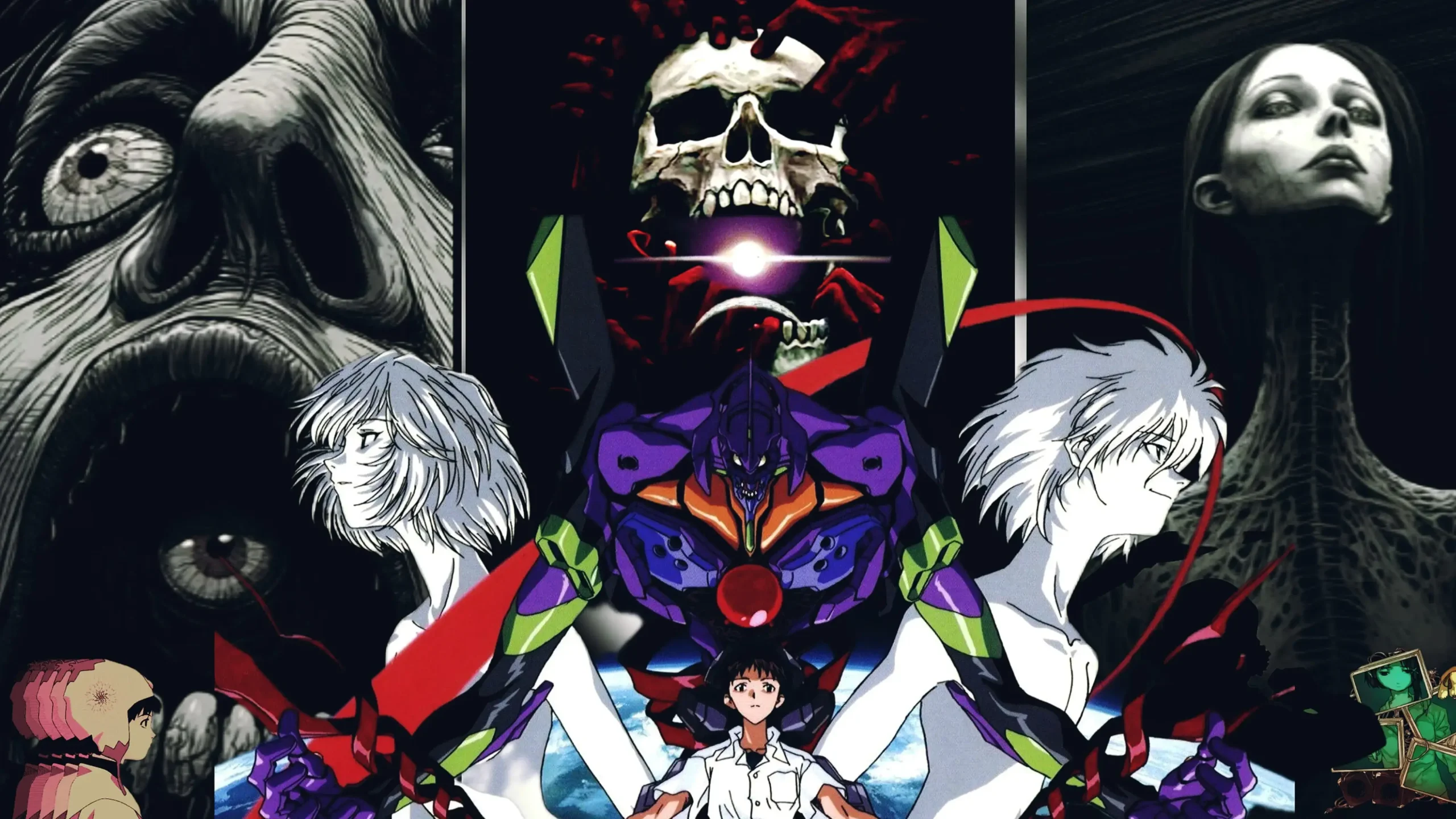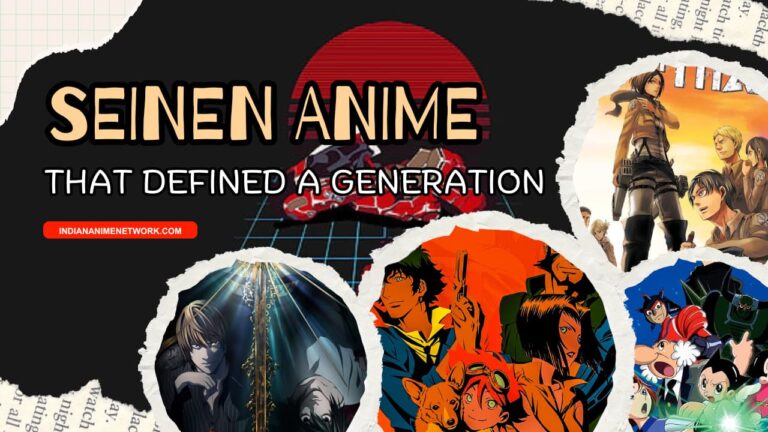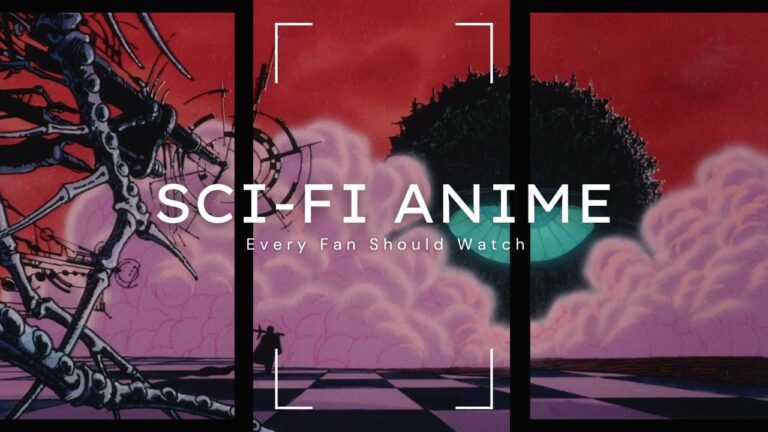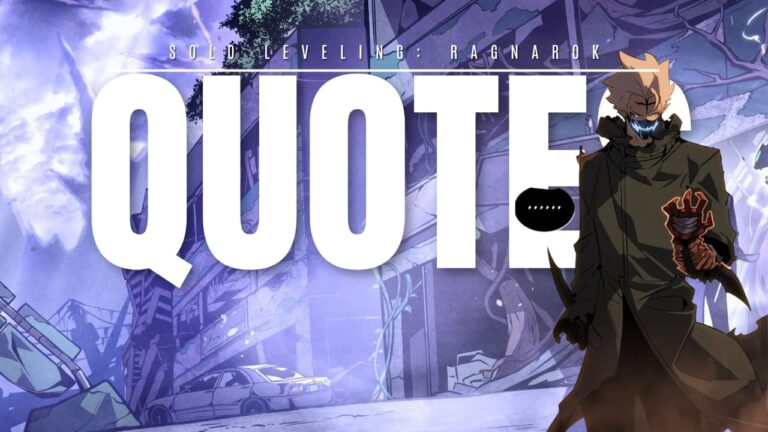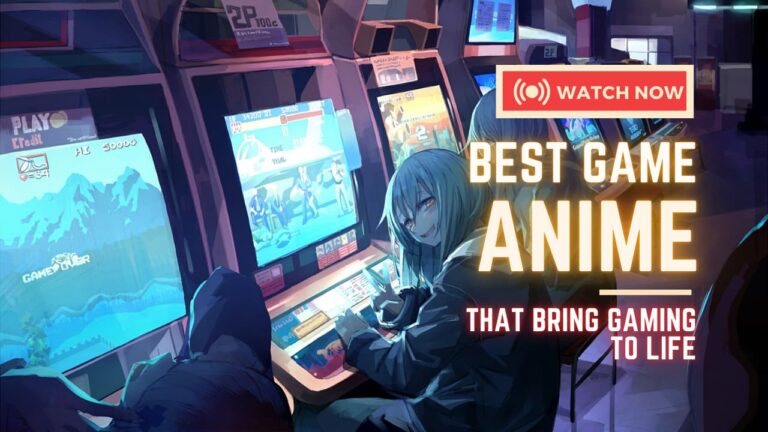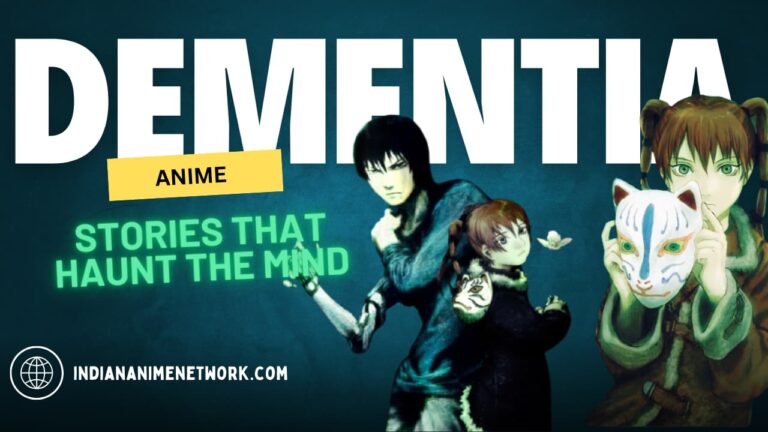12+ Must-Watch Psychological Horror Anime to Stream Today
Psychological horror, a subgenre that delves into the depths of the human mind, has a rich history in anime.
While the genre’s roots can be traced back to classic horror films, anime has developed its unique approach to psychological horror, often incorporating elements of science fiction, mystery, and drama.
The word “horror” derives from the Latin word “horrere,” which means “to bristle” or “to stand on end.” This suggests a sense of fear, dread, or revulsion that causes one’s hair to stand on end.
In essence, psychological horror is a genre that uses the mind as a tool to create fear and suspense.
It explores the psychological depths of its characters, often blurring the lines between reality and illusion, and challenging viewers’ understanding of what is truly terrifying.
Without further ado, here are twelve influential psychological horror anime (in no particular order) that have shaped the genre over the years, leaving a lasting mark on otaku culture and gaining widespread popularity.
Perfect Blue (1997):
Nobody cares for you anymore. You’re tarnished and you’re filthy.
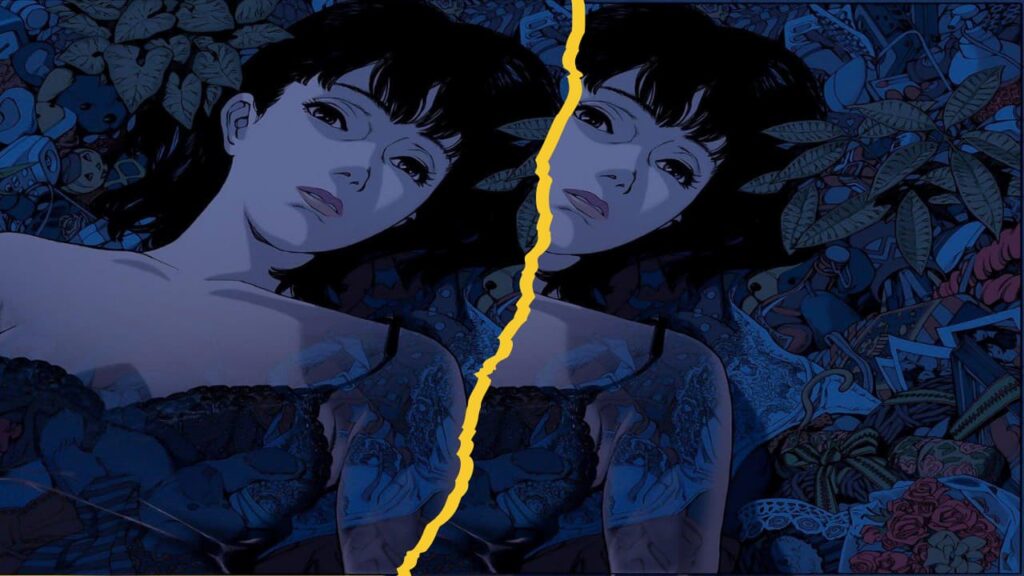
Perfect Blue, directed by Satoshi Kon is a seminal work in the psychological horror genre, offering a harrowing exploration of identity, perception, and the dark undercurrents of fame.
It has had a profound impact on the genre, blending psychological depth with horror to create a compelling and unsettling narrative.
At its core, Perfect Blue is a profound psychological exploration of identity and self-perception. The film delves into the existential horror of losing oneself amidst the demands of fame and the invasion of personal privacy
One of the most striking aspects of the film is its examination of the disintegration of the main protagonist Mima’s transition from a cheerful idol to a more mature actress is fraught with personal and psychological turmoil.
This transformation is depicted with chilling intensity, as her sense of self becomes fragmented and distorted.
The film explores the psychological impact of fame, suggesting that the public’s perception and personal identity can become dangerously intertwined.
The line between reality and fantasy becomes increasingly indistinguishable, with Mima’s disorientation highlighted by the quote, “It’s not a question of whether you’re going to be crazy. It’s a question of when.”
This sentiment encapsulates the film’s exploration of psychological fragmentation and the fragility of the human mind.
The horror in Perfect Blue is deeply rooted in psychological manipulation and intrusion.
The stalking subplot introduces a palpable sense of dread, as Mima is haunted by a figure who seems to know her every move.
This intrusion into her private life is a potent symbol of the invasive nature of fame and the dehumanizing effects of public scrutiny.
The film’s depiction of Mima’s growing paranoia and the blurring of reality and illusion evokes a deep sense of unease, making the viewer question the nature of reality itself.
Neon Genesis Evangelion (1995):
Sometimes You Need A Little Wishful Thinking To Keep On Living.
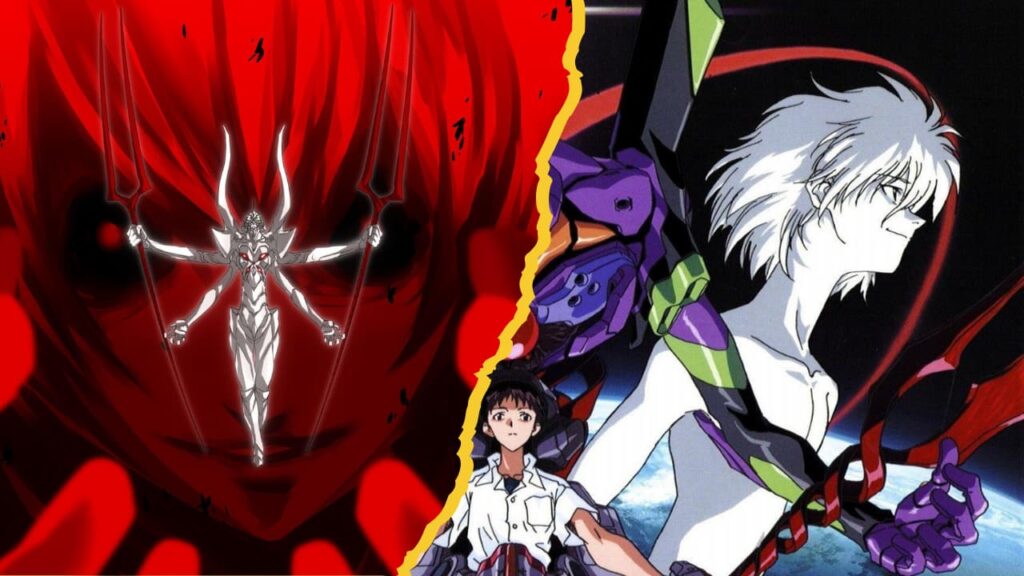
Neon Genesis Evangelion is a seminal work in the anime genre that transcends conventional boundaries to deliver a profound and unsettling psychological horror experience.
This series intricately weaves a complex narrative with deep psychological and existential themes, offering a haunting exploration of the human psyche amidst apocalyptic drama
Set in a post-apocalyptic world, Neon Genesis Evangelion unfolds in a society under constant threat from enigmatic beings known as Angels.
To combat this existential threat, humanity deploys giant bio-mechanical mechs, called Evas, piloted by selected individuals.
The narrative delves into the psychological and emotional turmoil experienced by these pilots, juxtaposed against the backdrop of an impending global catastrophe.
The central theme revolves around the fragmentation of the self and the struggle to find meaning in an indifferent and chaotic world.
One of the most striking aspects of Evangelion is its exploration of existential crises and the search for self-identity. The series examines the psychological impact of immense responsibility and the profound loneliness that accompanies it.
The narrative is punctuated by the existential observation: “The more you fear, the more you suffer.”
This sentiment encapsulates the internal struggles faced by the characters, highlighting their emotional vulnerability and the existential weight of their roles.
The horror in Neon Genesis Evangelion emerges not from external threats alone but from the internal disintegration of its characters.
The psychological terror is conveyed through the depiction of intense self-reflection, delusions, and the fragility of human consciousness.
The series often blurs the line between reality and hallucination, creating a disorienting experience that mirrors the inner turmoil of its characters.
This is exemplified by the narrative’s assertion that “The mind is a labyrinth, and the deeper one ventures, the more one confronts their own demons.”
This reflects the series’ thematic focus on the psychological labyrinth that each character must navigate.
Serial Experiments Lain (1998):
No matter where you go, everyone’s connected.
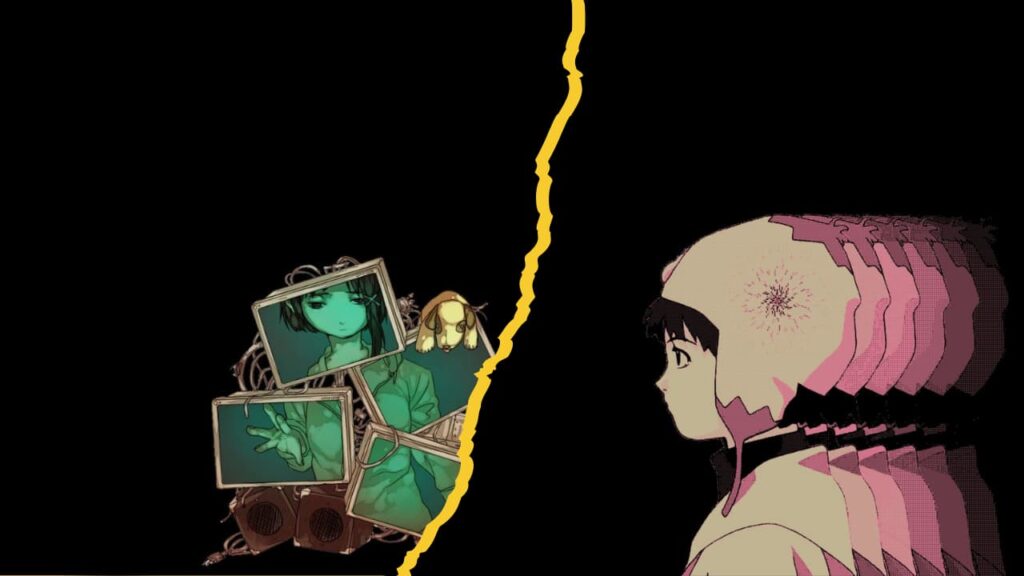
Set in a near-future world where the boundaries between the physical and digital realms are increasingly blurred, Serial Experiments Lain explores the life of a young individual who becomes entangled in a mysterious and dark network called the Wired.
As she delves deeper into this virtual world, she uncovers unsettling truths about her own existence and the nature of reality itself.
The anime excels as a psychological horror by addressing themes of identity, reality, and existential dread.
It presents a narrative where the concept of self is continuously questioned and dissected, leading to an exploration of the nature of consciousness and the impact of technology on personal identity.
One of the series’ central themes is the dissolution of reality, as the protagonist grapples with the encroachment of the digital world into her understanding of the real world.
The narrative interrogates the nature of existence, suggesting that the digital and physical worlds are increasingly interwoven.
This theme is poignantly encapsulated by the line, “Reality is just a shared illusion; the more we try to understand it, the more it eludes us.”
This perspective highlights the series’ exploration of the fluidity and fragility of perceived reality.
The horror in Serial Experiments Lain is rooted in the psychological disorientation experienced by both the protagonist and the viewer.
The anime’s portrayal of a pervasive and intrusive digital realm creates a sense of existential unease, emphasizing the unsettling effects of technology on the human psyche.
The narrative evokes a profound sense of dread, reflecting the inherent fears associated with the unknown and the uncontrollable.
The series effectively conveys this tension through its unsettling depiction of technology as a means of psychological invasion, with the haunting observation:
“The more you connect with the Wired, the more you disconnect from yourself.”
Paranoia Agents (2004):
This is heaven! So fine! You know, this really is heaven! Most delightful…
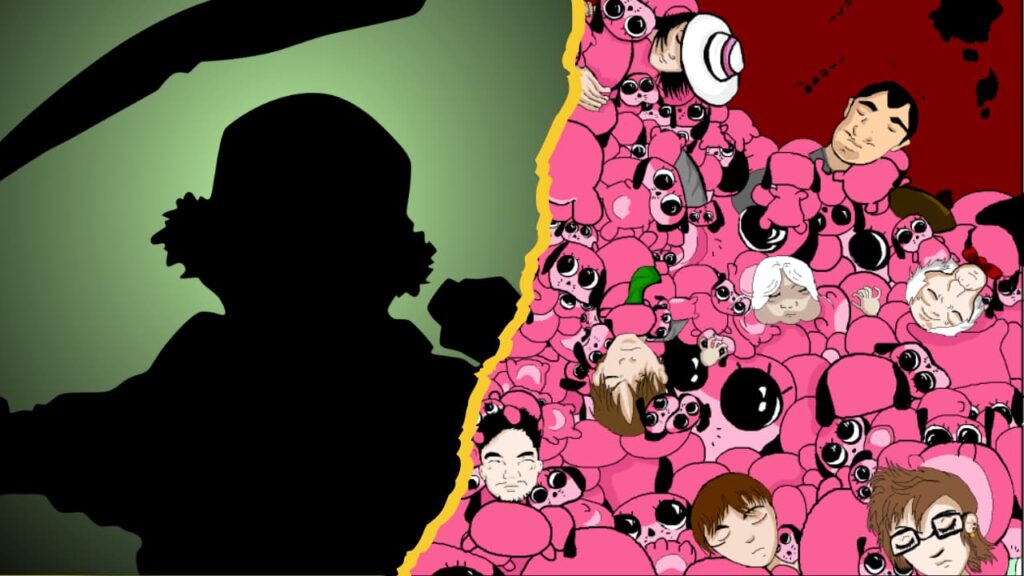
Directed by Satoshi Kon, it is a notable entry in the psychological horror genre, distinguished by its complex narrative and intricate thematic exploration.
The series skillfully intertwines elements of psychological horror with social commentary, creating a deeply unsettling and thought-provoking experience.
The series excels in psychological horror by probing themes of collective anxiety, personal trauma, and societal dysfunction.
It examines the ways in which individual fears and societal pressures manifest into real-world horrors, creating a narrative that is both surreal and deeply resonant.
A central theme in Paranoia Agent is the manifestation of collective fears. The attacks perpetrated by Lil’ Slugger are not merely random acts of violence but are symptomatic of deeper societal issues and personal anxieties.
The series suggests that these fears are not only reflective of individual concerns but also indicative of broader societal malaise.
This is captured in the observation: “The monsters we create are often reflections of the fears we refuse to confront.”
This perspective highlights the series’ exploration of how external horrors can be a manifestation of internal and societal turmoil.
The horror in Paranoia Agent is conveyed through a combination of psychological tension and surreal elements. The series blurs the lines between reality and delusion, creating a disorienting and eerie atmosphere.
The unsettling nature of the attacks and the pervasive sense of paranoia reflect the psychological strain experienced by the characters.
This tension is epitomized by the quote: “In a world where reality and illusion intertwine, the greatest fear is losing one’s grasp on the truth.”
This sentiment underscores the series’ thematic focus on the fragility of perception and the impact of psychological stress on understanding reality.
Monster (2004):
Once You’re In The Darkness, You Just Sink Deeper Into It. Keep Your Light Shining.
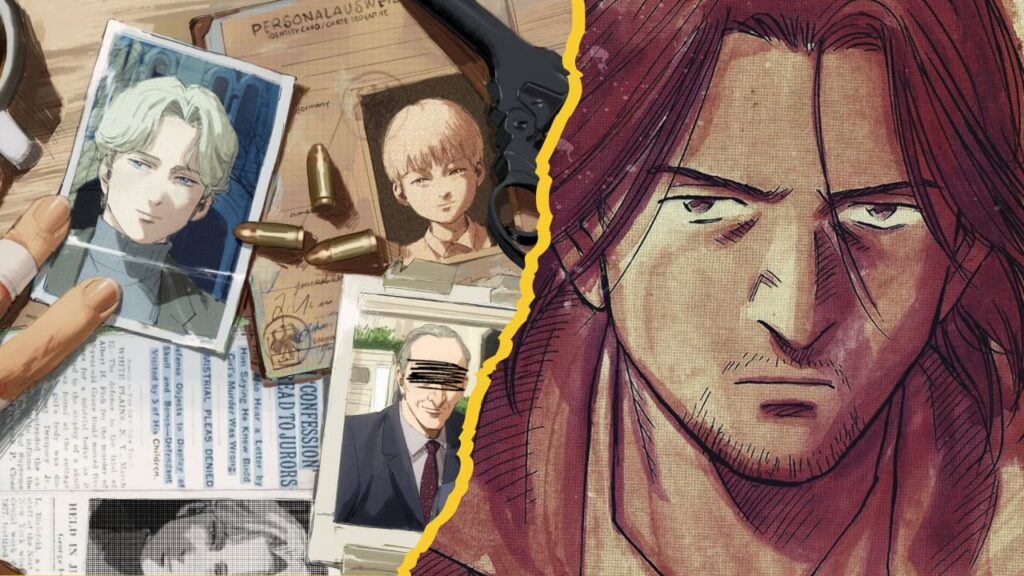
Set in a post-Cold War Europe, Monster follows a gripping narrative centered on a series of brutal murders and the ensuing investigation.
The story begins with a renowned surgeon who becomes embroiled in a harrowing quest for truth after an act of compassion inadvertently sets off a chain of violent events.
The investigation reveals a complex web of deception, manipulation, and psychological trauma, leading to an exploration of the darkest aspects of the human psyche.
The series excels in its exploration of psychological horror, delving into themes of identity, moral ambiguity, and malicious intent.
The narrative is a profound examination of how personal choices and past traumas shape one’s identity and actions. One of the core themes of Monster is the existential struggle between good and evil.
The narrative explores the idea that moral choices are often more complex than they appear and that the line between hero and villain is frequently blurred.
This theme is poignantly expressed in the series’ assertion: “In the depths of human nature, the struggle between light and darkness is ceaseless and relentless.”
This perspective underscores the series’ exploration of the internal and external forces that drive human behavior.
“The mind, once fractured by trauma, may never fully heal, and its broken pieces can become weapons against the self and others.”
Rather than presenting a traditional villain, the antagonist embodies a multifaceted exploration of human nature challenging traditional notions of evil.
This character’s actions and motivations are driven by a complex interplay of personal trauma, psychological manipulation, and a deep-seated sense of purpose.
The antagonist’s psychological profile is central to the series’ exploration of moral ambiguity, pushing viewers to confront unsettling questions about the nature of evil and the capacity for darkness within individuals.
Blood+(2005):
Why are you lonely when you have all the villagers to be friends with?
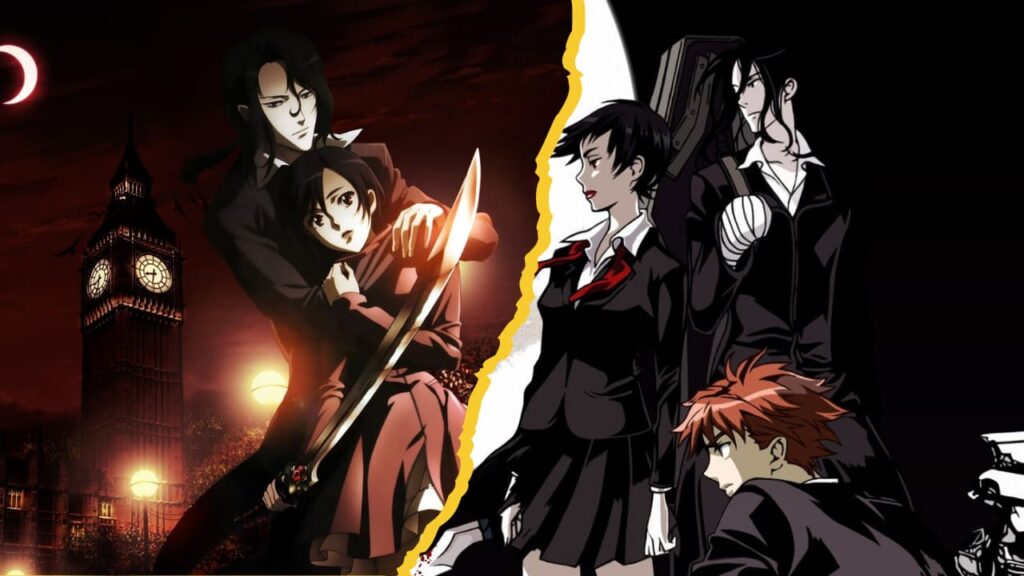
The series is set in a world where a young individual finds themselves embroiled in a harrowing battle against supernatural entities known as Chiropterans—vicious, bloodthirsty creatures that pose a significant threat to humanity.
The narrative unfolds as this individual uncovers buried truths about their own past and the ongoing struggle against these malevolent beings.
At its core, Blood+ is a psychological horror that examines the impact of trauma and identity crisis. The protagonist’s journey is characterized by a profound internal conflict, as they grapple with the revelations of their past and the monstrous forces they must confront.
The anime explores how deeply-seated trauma can shape one’s sense of self and the existential dread associated with confronting one’s monstrosity.
The series delves into the psychological horror of discovering that one is connected to the very entities they are fighting against.
This theme is powerfully expressed through the notion that “Monsters are not defined by their appearance, but by the darkness that resides within.”
This quote underscores the series’ exploration of the duality of human nature and the internal conflict between one’s true self and the monstrous aspects revealed through external circumstances.
The psychological horror of Blood+ is further amplified by the depiction of relentless fear and existential crisis.
The protagonist’s experiences are marked by a constant struggle against overwhelming odds and the terrifying realization that their identity is intertwined with the very forces they are fighting.
This sense of existential dread is captured by the observation: “In the battle between light and darkness, the true horror lies in the shadows that lurk within the soul.
Paprika (2006):
Once the mind is breached, reality itself can unravel.
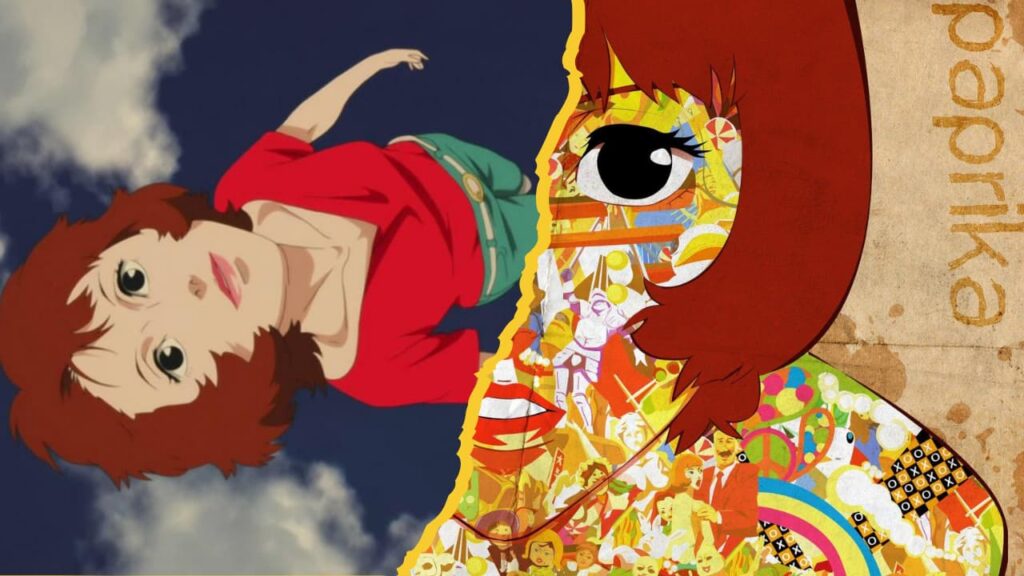
Manohla Dargis, the chief film critic for The New York Times described the film as “there’s something sinister about the dreamscapes in “Paprika,” fluidly rendered in both hand-drawn and 3-D animation, which may seem peculiar for moviegoers used to more benign animated fantasies.”
And that is certainly true. The narrative of Paprika is a cerebral journey into the fragile boundaries between dreams and reality, exploring the chaos that ensues when these realms collide.
It presents a world where technology’s intrusion into the unconscious mind opens a Pandora’s box of fears, desires, and existential anxieties.
Set in a near future where advanced technology allows individuals to enter and manipulate dreams, Paprika centers on a device known as the DC Mini, which grants access to people’s subconscious thoughts and fantasies.
Initially developed for therapeutic purposes, the device soon falls into the wrong hands, unleashing terrifying consequences. The boundary between dreams and waking life begins to dissolve, creating a nightmarish reality.
At its core, Paprika is a meditation on identity, perception, and the unconscious mind. The narrative explores how dreams serve as windows into hidden desires, traumas, and fears, blurring the line between reality and illusion.
This psychological horror stems from the terror of losing control over one’s own mind, as the dream world’s fluid, uncontrollable nature begins to invade waking life.
The film questions the nature of reality itself, presenting the unsettling thought: “When you can no longer distinguish between a dream and reality, which one do you trust?”
Moreover, the film emphasizes the fragility of the human mind, revealing how quickly one’s sense of self and perception can unravel.
This idea is powerfully illustrated through the reflection, “In the face of our deepest desires and fears, control is just an illusion we cling to.”
Paprika remains a timeless meditation on the precarious nature of reality itself. The film’s ability to blend surrealism with existential dread cements it as a standout in both psychological horror and anime.
Higurashi When They Cry(2006):
Perhaps living without sin is a sin in itself.
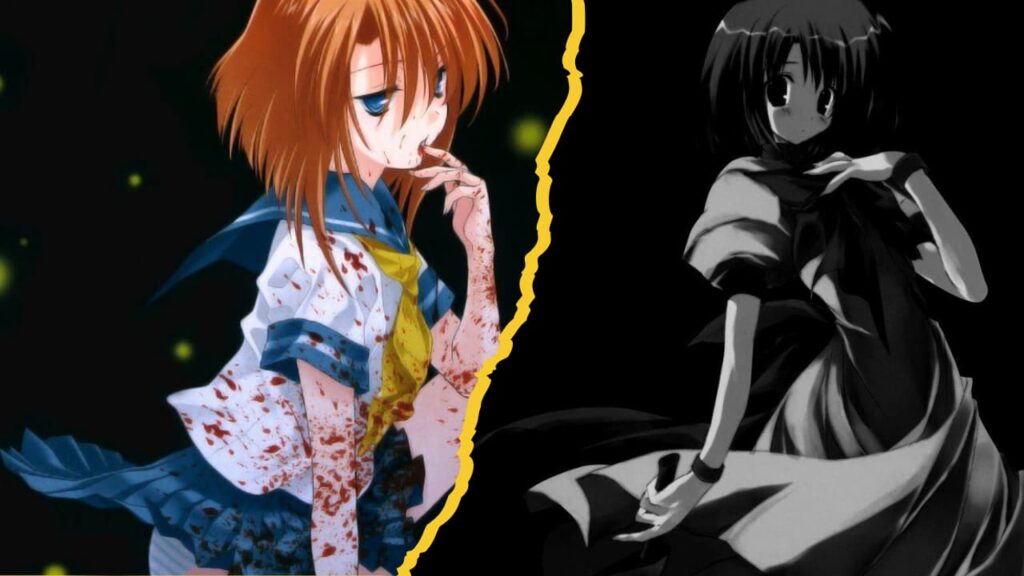
Based on the visual novel series by 07th Expansion, masterfully blends psychological horror with a deeply layered narrative, crafting an atmosphere of dread, paranoia, and existential uncertainty.
The series revolves around the chilling events in a seemingly idyllic rural village, where secrets, suspicion, and inexplicable violence lurk beneath the surface.
Set in a tranquil yet isolated village, Higurashi initially presents itself as a typical slice-of-life story, with an emphasis on the everyday lives of its residents.
However, the narrative quickly devolves into a disturbing cycle of violence and psychological terror.
The village harbors dark secrets tied to an ancient curse, and each arc of the story sees its characters trapped in a nightmarish loop of events, where time resets but the horrors remain.
Each cycle forces the viewer to piece together fragments of a larger, more sinister mystery.
The heart of Higurashi lies in its exploration of paranoia, and madness showing how fear, isolation, and distrust can fracture the minds of individuals, turning once close companions into threats.
One of the most unsettling aspects of the narrative is the constant fluctuation between innocence and horror. The characters’ personalities oscillate between friendliness, naivety, and sudden bouts of irrational terror and brutality.
These shifts reflect the series’ thematic exploration of mental instability, encapsulated by the line, “When fear consumes the mind, even the most innocent faces can become monstrous.”
This captures the show’s focus on how psychological deterioration can turn familiar and comforting environments into hostile and terrifying places.
At its core, Higurashi interrogates the nature of memory and perception, asking viewers to question the reliability of what they see and understand.
As events repeat and diverge slightly in each arc, it becomes clear that the characters’ memories and actions are subject to change, leaving the audience to ponder what is truly real.
Shiki (2010):
Monsters aren’t born; they are made in the crucible of fear.
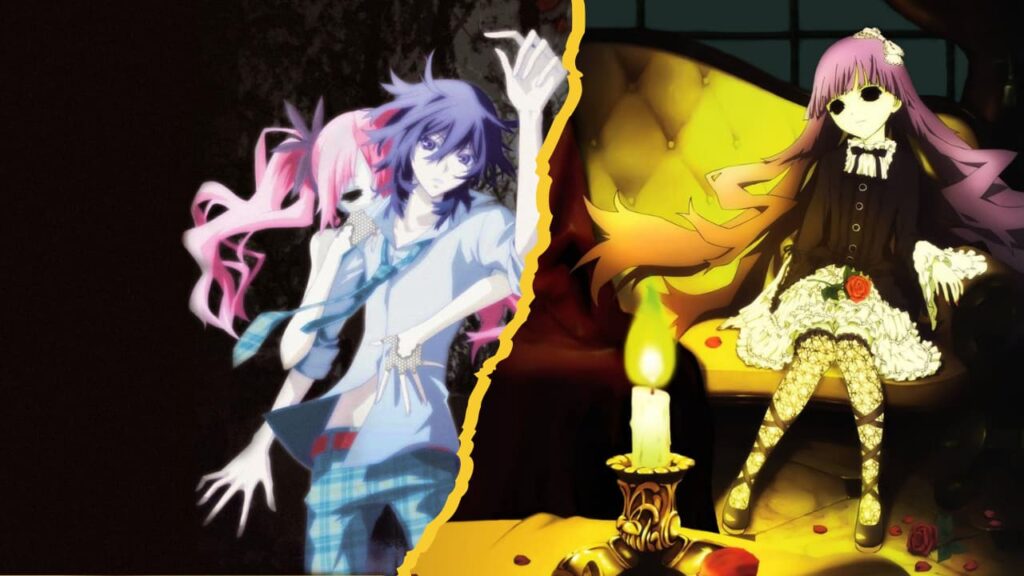
Shiki is an exceptional entry into the psychological-horror genre; set in a remote village beset by eerie and inexplicable deaths, the anime explores the conflict between humanity and the supernatural, while diving deep into the moral complexities that arise from survival & fear.
The story unfolds in the small, isolated village of Sotoba, where the residents begin to die under mysterious circumstances.
What initially appears to be a plague is soon revealed to be something far more sinister—an invasion of vampiric beings known as Shiki, who rise from the dead and prey upon the living.
The village’s peaceful existence is shattered as paranoia, suspicion, and fear spread like wildfire, leading to moral dilemmas that challenge the boundaries between humanity and monstrosity.
The series doesn’t simply present its antagonists as mindless monsters but offers a thought-provoking examination of both the Shiki and the human villagers, showing that the line between victim and villain is often blurred.
The narrative tackles deep psychological questions about what it means to survive and whether doing so at the cost of others is justified. “In the struggle for survival, morality is the first casualty.”
Shiki offers a fresh perspective on the vampire mythos, infusing it with deep psychological and ethical questions that resonate far beyond the typical creature-feature narrative.
The series has been praised for its willingness to challenge viewers’ perceptions of good and evil, and for presenting a story where no one is entirely innocent or entirely guilty.
This duality is central to the narrative’s moral ambiguity: is it truly evil to kill for survival, or are the humans’ attempts to eradicate the Shiki just as monstrous?
Psycho-Pass (2012):
I think the only time people really have value is when they act according to their own will.
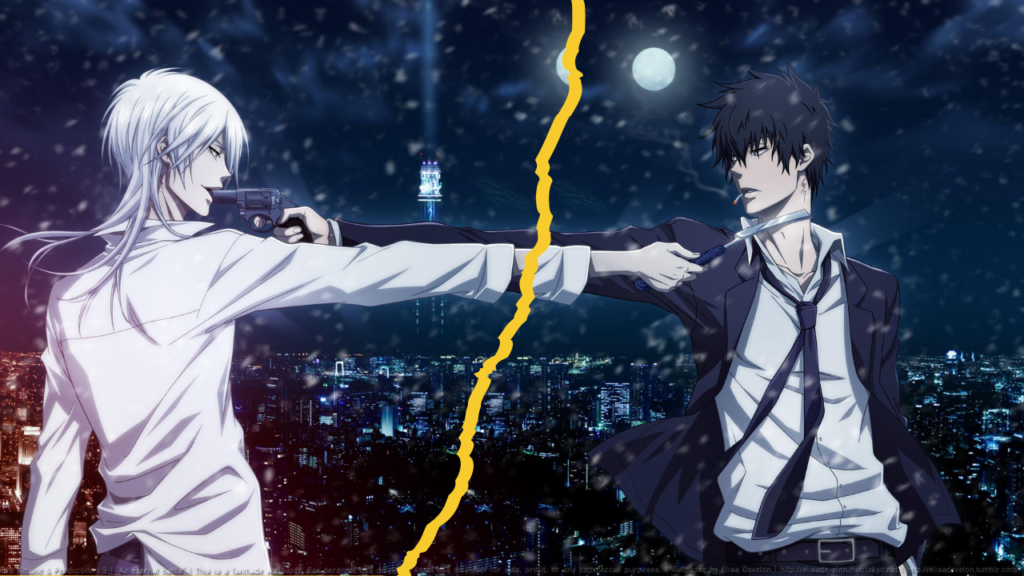
Psycho-Pass is an intense thought-provoking psychological horror anime that dives deep into themes of surveillance, morality, and the complexities of free will in a dystopian future.
The series is set in a world where an all-encompassing system, known as the Sibyl System, monitors the mental states of individuals to predict and prevent criminal behavior.
This intricate narrative weaves together psychological tension, philosophical questions, and chilling commentary on societal control.
“The more you fear becoming a criminal, the more likely you are to fall into the trap the system sets. It’s a vicious cycle of stress and judgment.”
Psycho-Pass excels at deeply examining the notion of free will versus state control and the moral ambiguity that arises from living under constant surveillance.
The Sibyl System’s omnipresence, which dictates the worth and future of each individual, reflects the dehumanizing effects of technology and questions whether a society can be truly just when every action is predicted and controlled.
The system uses a Crime Coefficient to measure an individual’s likelihood of committing a crime.
Those with a high Crime Coefficient are labeled as “latent criminals” and are either rehabilitated or eliminated, depending on the severity of their mental instability.
Does this system, designed to eliminate potential crime, actually prevent criminal behavior—or does it exacerbate psychological instability, thereby increasing the very risk it claims to mitigate?
The dehumanization of people into mere data points highlights the ethical dilemma of treating potential criminals as guilty. Are we eradicating future violence, or pushing vulnerable civilians toward it through social isolation and psychological pressure?
“When you are constantly judged by an invisible standard, it’s hard not to become what you’re feared to be. The system doesn’t just monitor; it shapes behavior through fear and pressure.”
Devilman Crybaby (2018):
Even in the light, there’s a shadow that never fades. That shadow is the true horror.
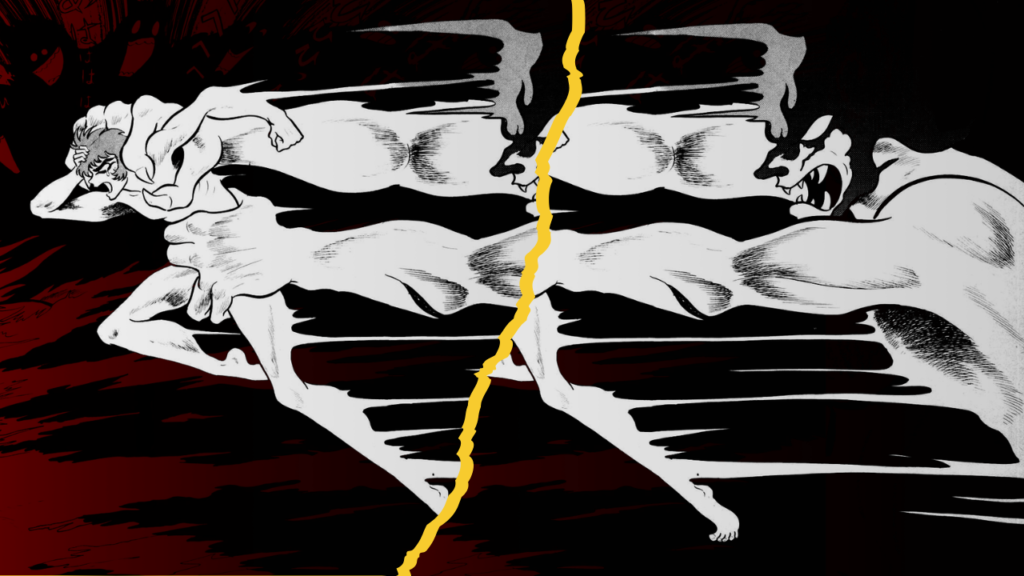
The series offers a stark and unrelenting examination of human nature, morality, and the essence of evil, framed within a visually striking and emotionally charged narrative.
Devilman Crybaby is characterized by its distinctive and often grotesque art style. The animation is raw and expressive, capturing the intense and chaotic nature of the narrative.
The use of vivid colors and surreal imagery contributes to the series’ visceral impact, enhancing the psychological and emotional intensity of the story.
Set in a modern world where demons and supernatural entities exist alongside humanity, Devilman Crybaby follows a young man who becomes the host of a powerful demon.
As he struggles to maintain his humanity while grappling with the demonic influence, he is thrust into a chaotic conflict between demons and humans.
The narrative unfolds with a sense of impending doom, exploring the consequences of unchecked power and the nature of evil.
One of the central themes of Devilman Crybaby is the corruption of innocence and the descent into madness. As the protagonist struggles with his demonic transformation, the series explores the psychological toll of his dual existence.
The narrative captures the chaos and horror of this internal conflict with the haunting assertion, “In the end, it’s not the demons that are the true monsters. It’s the humans who have forgotten their own humanity.”
The relentless violence and suffering depicted in the anime highlight the futility and tragedy of human existence, underscored by the grim observation, “The more we strive for meaning, the more we face the void.”
This perspective encapsulates the existential horror at the heart of the series, portraying a world where meaning and redemption are elusive.
The Promised Neverland (2019):
“In a game of survival, the mind is the ultimate weapon.”
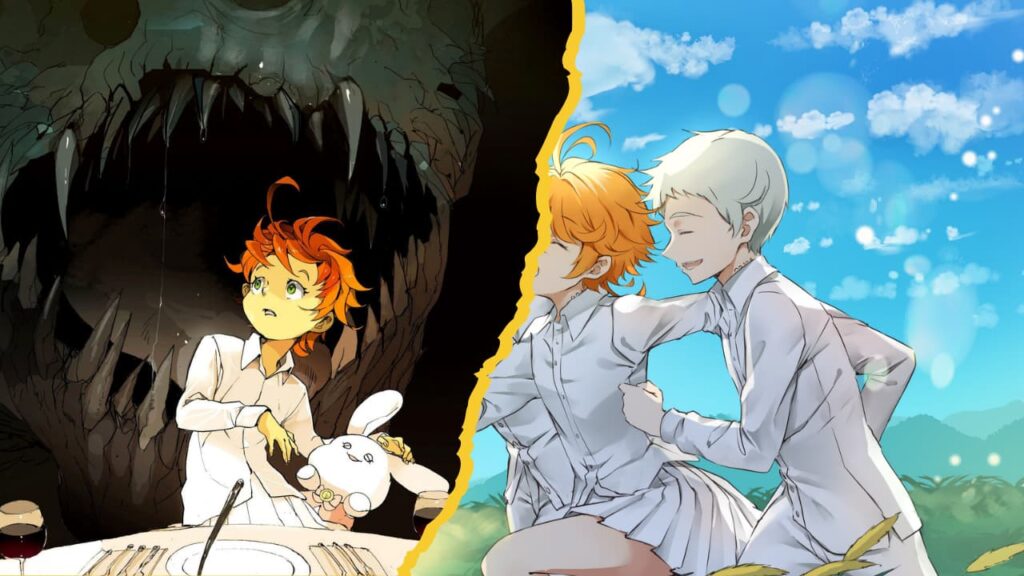
Set in a seemingly idyllic orphanage, The Promised Neverland begins with the discovery that the orphanage’s apparent tranquility masks a horrific reality.
The story follows the children as they uncover the dark truth about their existence and devise a plan to escape from the clutches of their sinister caretakers.
The narrative unfolds in a tense and suspenseful manner, highlighting the children’s desperate struggle for survival and freedom.
The anime explores themes of betrayal and loss of innocence, as the children’s initial belief in the safety and comfort of their home is violently shattered.
Their psychological journey involves grappling with the reality of their situation and the implications of their planned escape.
The tension between the children’s hope for freedom and the looming threat of discovery creates a constant atmosphere of suspense.
The central group of children, consisting of the most intelligent and resourceful among them, comes together to devise a daring escape plan.
Their efforts are marked by strategic thinking and collaboration, as they work to outwit their caretakers and navigate the dangers that lie beyond the orphanage’s confines.
Their collective intelligence and emotional strength become crucial as they confront the existential dread of their situation and the imminent threat posed by their would-be predators.
The strategic elements of their escape plan highlight the importance of intellect and teamwork. The children’s ability to adapt and devise clever solutions to their predicament underscores the series’ emphasis on psychological and emotional resilience.
Their collective efforts are driven by a deep-seated determination to reclaim their freedom and survive against overwhelming odds.
“Every step you take towards freedom is a step away from everything you once knew. It requires courage to leave behind the familiar and face the unknown.”

